
by Mirjam | May 26, 2014 | 2014, Awareness, Bedtime Routines, Being Thankful, Childhood, Discipline, Family, Girls, Kids, Life Balance, Milestones, Motherhood, Netherlands, Parenting, Sleep, Sleep and Children, World Motherhood, Younger Children
 Long term goals versus short term goals.
Long term goals versus short term goals.
(You have probably scrolled up and down to see if you’re at the right place. Yes you are. Continue to read.)
Short term goals are goals that you want to achieve instantaneously. There is immediate result and you benefit directly.
Long term goals are goals that you want to achieve in the future.
It will take you a while to achieve these goals and you have to be patient and persistent to achieve your goal.
Bear with me now…This is going to make sense, I promise.
Example. You are hungry.
Short term goal: I want to eat something.
Long term goal: I want to maintain my gorgeous figure. (ahem…Just go with me on this one…)
If you focus on your short term goal, anything will do: a snickers bar, ice cream, donuts, anything.
But if you bring in the long term goal, you will need to think about how you are going to achieve your long term goal, while keeping in mind your short term goal.
In other words:
how am I going to still my hunger without ruining my fantastic figure.
Got it? Simple, right?
So, why am I talking about goals?
Because they relate to parenting.
Parenting is a job where you constantly have to remember that it is about the long term goals.
But the present is so in our face, that sometimes we forget and go with the short term goals and eventually pay the price.
Example: You’re in the supermarket with your child.
Your child is tired cranky, difficult.
But you have to do this.
We all know that this is a scenario for a possible disaster.
And we all know how easy it is, to give the child some candy or a cookie and get the job done.
(I’ve done it, you’ve done it, I’m guessing we all have.)
But what is the long term goal here?
You want to be able to do your groceries in peace and quiet.
And possibly have a great time doing it, maybe even some skipping and singing.
Too far fetched? Okay, let’s back up..
How do you achieve that long term goal?
By NOT giving the candy.
By planning and repeating rules, by making sure your child is fed and well rested,
whenever you enter the supermarket.
By praising your child for good behavior,
by making sure you build up the amount of time you spend at the supermarket.
How do you achieve that long term goal?
By investing.
This is what I do all day, it is hard.
It requires an enormous amount of energy.
Sometimes I have to be patient, because I am somewhere in between the process of achieving my long term goal
and I just cannot see the end of it. Sometimes I’m tempted to go for the short term goal.
You want me to give your ten teddy bears, little blankets and little beds for the night?
And you want me to make sure they are all in the right bed with the right blanket,
and you change your mind about it every second? Sure kid. If I get to crash on the couch and you finally go to sleep after that.
Sure, I’ll do it.
But then I ask myself this question:
Do I really want to spend my evenings running around, taking care of dolls and teddy bears
and every other stuff that you seem to come up with just around bedtime?
Or do I want bedtime to be quiet and peaceful and efficient.
And I realize, that I want the latter.
So I take a deep breath, and choose the battle.
On my last nerves, desperate to choose the couch instead.
I explain to my hysterical screaming child that it is bedtime, not playing time.
She will lie down now and Mommy will go downstairs.
She screams, she cries, she stomps her feet. I go up and down the stairs four or five times.
She won’t calm down. I cuddle, but I don’t give in.
Finally she goes to sleep.
I throw myself on the couch, tired, discouraged.
Next night:
“Mommy I want the big bear and the little bear and my giraffe, and…”
“You can pick two stuffed animals and then you will go to sleep. It’s sleepy time, not playtime.”
She screams. I kiss and cuddle her and walk away.
Before I reach the couch it is quiet. Really quiet.
I sneak upstairs to see what she’s doing.
She’s fast asleep with three stuffed animals..
I am well on my way to reaching my long term goal.
Does any of this sound familiar? What are your long term (parenting) goals?
This is an original post to World Moms Blog from our writer in The Netherlands, Mirjam.
The picture used in this post is credited to the author.
Mirjam was born in warm, sunny Surinam, but raised in the cold, rainy Netherlands.
She´s the mom of three rambunctious beauties and has been married for over two decades to the love of her life.
Every day she´s challenged by combining the best and worst of two cultures at home.
She used to be an elementary school teacher but is now a stay at home Mom. In her free time she loves to pick up her photo camera.
Mirjam has had a life long battle with depression and is not afraid to talk about it.
She enjoys being a blogger, an amateur photographer, and loves being creative in many ways.
But most of all she loves live and laughter, even though sometimes she is the joke herself.
You can find Mirjam (sporadically) at her blog Apples and Roses where she blogs about her battle with depression and finding beauty in the simplest of things. You can also find Mirjam on Twitter and Instagram.
More Posts - Website
Follow Me:



by Natalia Rankine-Galloway (Morocco) | May 23, 2014 | 2014, Awareness, Childhood, Communication, Girls, Kids, Life Lesson, Milestones, Motherhood, Parenting, USA, Womanhood, World Motherhood, Younger Children
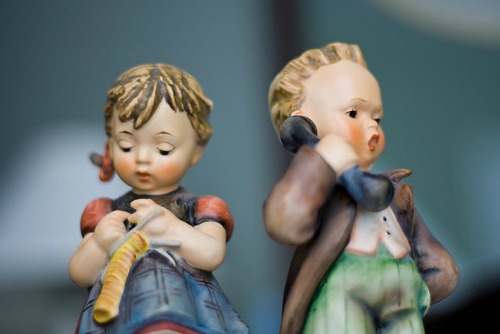
Last month’s Atlantic Magazine featured a cover page story on the “Confidence Gap” between men and women. For a variety of reasons both biological and environmental, women drastically underestimate their own competence. This, the article tells us, is a big obstacle to women accomplishing the success they are due.
While it was interesting to me that womankind as a whole seems to value themselves more meanly than mankind, it was all the more interesting to know that I wasn’t alone in feeling anywhere from out of my depth to outright fraudulent in many situations. Apparently many other ladies in the room were likely feeling just the same.
But more than anything else, the article left me examining a gap within myself. The gap between where I feel my confidence ought to be and where is actually is. And where it is, quite frankly, is way….way behind. Let’s say…1994 behind. (more…)

Natalia was born a stone's throw from the Queen's racetrack in Ascot, UK and has been trying to get a ticket to the races and a fabulous hat to go with it ever since. She was born to a Peruvian mother and an Irish father who kept her on her toes, moving her to Spain, Ireland and back to the UK before settling her in New York for the length of middle and high school. She is still uncertain of what she did to deserve that.
She fled to Boston for college and then Washington, D.C. to marry her wonderful husband, who she met in her freshman year at college. As a military man, he was able to keep her in the migratory lifestyle to which she had become accustomed. Within 5 months of marriage, they were off to Japan where they stayed for a wonderful 2 and one half years before coming home to roost. Baby Xavier was born in New York in 2011 and has not slept since.
A joy and an inspiration, it was Xavier who moved Natalia to entrepreneurship and the launch of CultureBaby. She has loved forging her own path and is excited for the next step for her family and CultureBaby.
Natalia believes in the potential for peace that all children carry within them and the importance of raising them as global citizens. She loves language, history, art and culture as well as Vietnamese Pho, Argentinian Malbec, English winters, Spanish summers and Japanese department stores...and she still hopes one day to catch the number 9 race with Queen Liz.
You can find her personal blog, The Culture Mum Chronicles.
More Posts

by Mannahattamamma (UAE) | May 21, 2014 | 2014, Awareness, Cultural Differences, Education, Expat Life, Feminism, Girls, Government, Human Rights, Nigeria, Politics, UAE, USA, Women's Rights
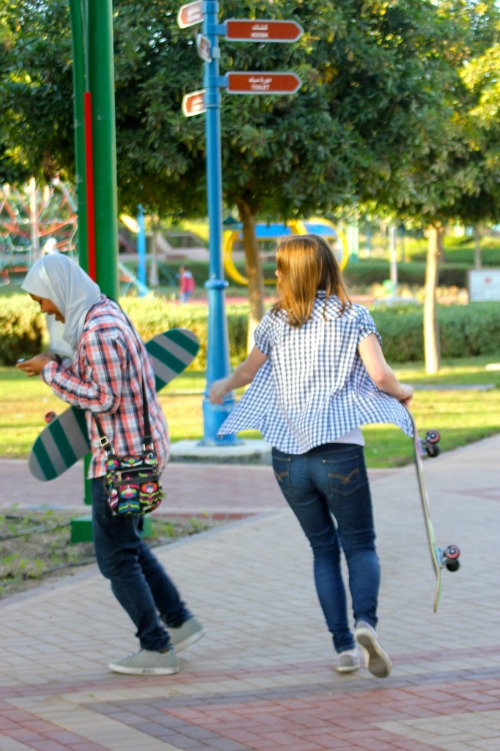
In March, I wrote a post in honor of Gloria Steinem’s birthday, in which I mentioned that when Steinem spoke at my college graduation way back in the 1980s, my friends and I had wished for a speaker who was more “relevant.” In our innocence, we believed that Steinem had won her fight; we were graduating from a women’s college and thought that fight for gender equality had been more or less won.
More than two decades later, I wish I could say that Steinem was irrelevant and that gender inequality is something we only read about in the history books.
When I wrote that post about Steinem, I was thinking about the Common Core curriculum, which relegates women’s contributions to history to the sidelines. Now, of course, we are all confronted with the horror that’s unfolding in Nigeria, and while the plight of those schoolgirls devastates me, it has become, in my mind, another instance in a long list of the ways in which groups (comprised mostly of men) attempt to score political points by seizing control of women’s lives. As an example, think about the Tea Party conservatives in the US, who prove their conservative bona fides in the United States by voting against support for Planned Parenthood, or Head Start, or universal kindergarten, or…
What is so scary about educating a girl? In the middle ages, accusations of witchcraft were often leveled against women who had amassed too much wealth or land, or who in some way differed from those around them. We teach our children that things like the Salem witch trials happened because “people didn’t know better” or because of “mass hysteria” but sometimes I wonder how far we have progressed since those days. What happens to women who challenge the status quo–or who have the potential to challenge the status quo? Don’t they still run the risk of being punished, whether literally or figuratively?
It’s funny to me now, but when I first moved to Abu Dhabi the two most obvious indications that we’d left Manhattan behind—besides the searing heat—were the adhan and the abaya-clad women: religion and covered bodies. I found the abayas more unsettling than the call to prayer, even as I sometimes envied the women their public invisibility. The longer we live here, however, my perceptions have changed so that I no longer see hijab as an automatic symbol of oppression or subjugation or second-class citizenry.
I would imagine, however, that as women here, we’ve all had moments where we’ve felt marginalized, silenced, lesser: the day I trotted down the sidewalk to get in a waiting cab and the cab driver chastised me by saying “women should not run, madam, I will wait, and you should walk.” Or when a guard at the border crossing into Oman looked over at the passenger seat where I was sitting (in long trousers) with one foot propped on the dashboard and told me “to put my foot down, sit like a lady, more properly, sit properly.” When that happened my first impulse was to laugh: surely he couldn’t be serious? But, of course, he was serious. I put both feet on the floor and looked at the map so that I didn’t toss out a few well-chosen swear words. (A general rule regardless of where you are: don’t swear at anyone, male or female, who is wearing a uniform at a border crossing.)
So yes, in that instance, I was silenced as I suppose I was by the cab driver too, who took it upon himself to offer some unsolicited advice. And yes, there is now a slight internal pause before I leave the house as I run through a kind of inner checklist about what I’m wearing: if short sleeves, a long skirt or pants, or vice versa (long sleeves, shorter skirt or shorts); do I have a shawl (equally for frigid air conditioning and bare shoulders); if I’m going to the beach, I make sure that my beach cover-up is more than a ratty t-shirt. There are days where I know I’ve failed the checklist and am too busy or late to care, but overall, I dress more modestly now than I used to and probably that’s not a bad idea: no one needs to see a fifty-year-old woman slopping down the street in cut-off shorts and a tank top.
Am I being repressed, or respectful? Does my feminism mean that I yell at the cabbie, keep my foot defiantly on the dashboard, saunter down the street in a halter top and tight jeans? Or, alternatively, does feminist politics remind us that silencing and the policing of women’s bodies happens—sadly—in almost every culture in the world, including the US? Without making light of the specifics of being female in this region, I’ve come to think of the issues facing women in this part of the world as being differences in degree, not kind, from the problems facing women in other parts of the world.
What do we, as women, do to help other women and girls find their voices–find our own? How do we create strength to silence those who would silence us?
This is an original post to World Moms Blog by Deborah Quinn in the United Arab Emirates of “Mannahattamamma.”
After twenty-plus years in Manhattan, Deborah Quinn and her family moved to Abu Dhabi (in the United Arab Emirates), where she spends a great deal of time driving her sons back and forth to soccer practice. She writes about travel, politics, feminism, education, and the absurdities of living in a place where temperatures regularly go above 110F.
Deborah can also be found on her blog, Mannahattamamma.
More Posts
Follow Me:


by World Moms Blog | May 20, 2014 | 2014, Awareness, Girls, Government, Human Rights, Humanitarian, International, Social Good, Social Media, World Moms Blog

As a mother, it is really hard to see other mothers go through certain challenges. I think it’s in me to be supportive in whichever way that I can when there is something I can do about a situation….like the hundreds of Nigerian schoolgirls who have been kidnapped; I marched to show my support on Mother’s Day.
Every mother’s dream is to see her children have the best in life, which includes education. A famous quote by renowned Ghanaian educationist Dr James Kwegir-Aggrey is:
“if you educate a man you educate an individual, but if you educate a woman you educate a whole nation”
This describes the power of educating young girls. It is every girl’s right and boys too to have an education but when these dreams are shattered it becomes a concern to all. Everyone knows the power of education, and it is evident that when a child is educated, he or she is set on the path to greatness.
‘Education is the most powerful weapon which you can use to change the world’- Nelson Mandela.
Taking these girls away from school is like taking them away from their paths to greatness. We hope and pray that they are returned safely to their families. This is why mothers of Ghana joined the campaign to #BringBackOurGirls on this past Mother’s Day in Accra. It was a solidarity march to present a petition to the Nigerian high commissioner in Ghana organised by Yasmeen. A mother herself, she is a songstress with a golden voice and a concerned citizen of our continent Africa. You can listen to her here .
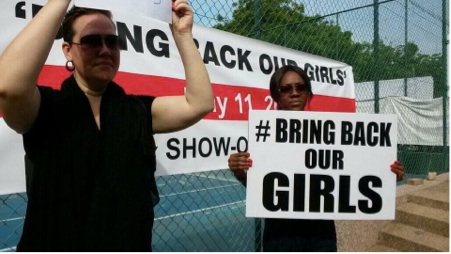
Mother’s Day is no fun if you know that another mother is grieving over her lost child. This was a great initiative by a group who care to march in solidarity in support of the kidnapped Nigerian school girls of Chibok. I saw the post on twitter and immediately wanted to be a part of this great cause. Thank you Yasmin for organising this!
It was an experience for both the young and the old as the children and babies were not left out. There were placards for everyone with ‘Bring Back Our Girls’ boldly inscribed on them. The media was present to cover the event, and the police were also there to ensure the safety of all who came for the walk.
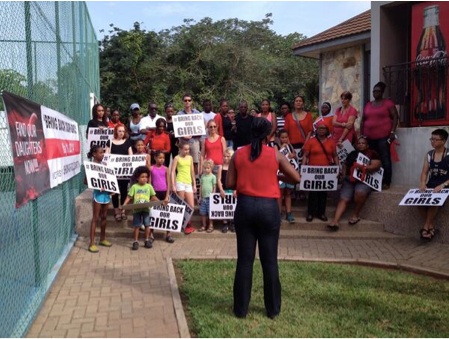
Almost everyone who came wore black and red to signify solemnity. Signatures were also appended on a banner which was later presented to the high commissioner. The walk was through some parts of the capital city of Ghana to the Nigerian High commissioner’s residence. It was such a solemn march and the support was so immense. As mothers everywhere are celebrated this month, let us not forget the ones who are heartbroken over their missing girls.
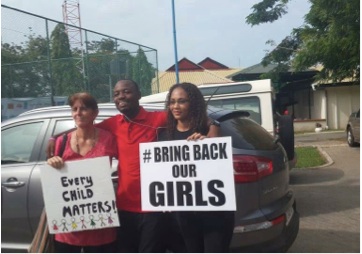
My heart aches each time I think of these girls or see a post about #BringBackOurGirls. We will not relent but continue to pray for the safety of the girls, their families and especially their mothers!
This is an original post written by Adwoa Gyimah of Ghana for World Moms Blog. Photo credits: Adwoa Gyimah
What more can we do to #BringBackOurGirls !?
World Moms Blog is an award winning website which writes from over 30 countries on the topics of motherhood, culture, human rights and social good. Over 70 international contributors share their stories from around the globe, bonded by the common thread of motherhood and wanting a better world for their children.
World Moms Blog was listed by Forbes Woman as one of the "Best 100 Websites for Women 2012 & 2013" and also called a "must read" by the NY Times Motherlode in 2013. Our Senior Editor in India, Purnima Ramakrishnan, was awarded the BlogHer International Activist Award in 2013.
More Posts

by Elizabeth Atalay | May 13, 2014 | 2014, Economy, Education, Environment, Ethiopia, Girls, Government, Health, Human Rights, Humanitarian, International, Maternal Health, Natural Disaster, Poverty, Social Good, Vaccines, World Moms Blog
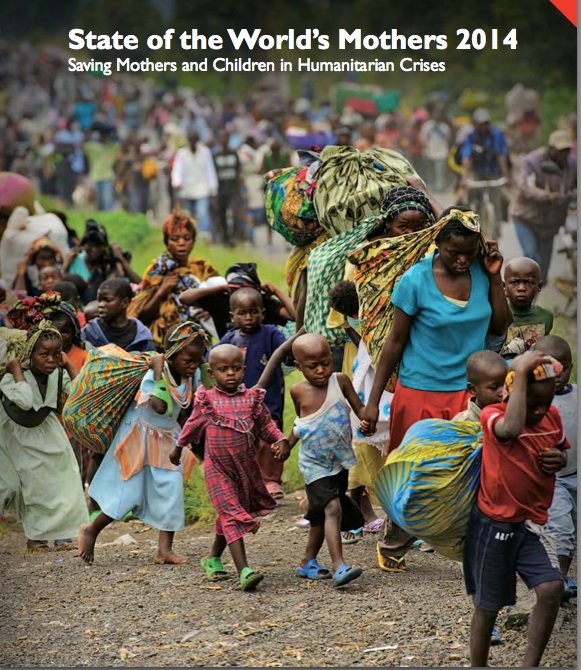
State of the Worlds Mothers Report Cover Photo By Phil Moore
The 15th annual State of the World’s Mothers Report was released last week by Save The Children, just in time for Mother’s Day, and World Moms Blog was there at the launch. The focus of the 2014 report is on saving mothers in humanitarian crisis, and the launch of the report in New York City was co-hosted by the Permanent Mission of the Philippines to the United Nations. In his welcome address to the room Permanent Representative H.E. Mr. Libran Cabactulan of the UN Mission of the Philippines acknowledged from first hand experience, that women and children suffer the most in crisis situations.
The report notes that worldwide women and children are up to 14 times more likely than men to die in disaster. In fact it is no surprise that also according to the report more than half of all maternal and child deaths world-wide take place in countries suffering conflict or natural disasters. As Werner Obermeyer, Deputy to the Executive Director of the WHO office to the UN stated, It is not the armed component in conflicts we are worried about, it’s those who are suffering from the armed component.
The purpose of the annual report is to further the mission of Save The Children in protecting the worlds most vulnerable mothers and children. The State of the World’s Mothers report does so by highlighting where we are failing, what effective solutions need to be put in place, and recommended policy changes towards progress. Despite the fact that 80% of the countries are not on target for achieving MDG 4 and 5, maternal and child health goals, the extreme progress seen in other countries previously failing, tells us that it is possible.
Ethiopia for example has reduced its risk of maternal death more than any other African country, by nearly two-thirds. H.E. Mr. Tekeda Alemu of Ethiopia stated that the progress there was due to a well crafted policy based on the participation of people on the local level. 48,000 health extension workers were fanned out throughout the country to mobilize women volunteers in what they called the Women’s Development Army to reach remote villages. Afghanistan has also cut maternal death rates by 60-70 percent, moving up 32 places on the Mothers’ Index Rankings of the best and worst countries in which to give birth. This proves that the combined investment of minds and funding works. If these countries with terrible track records have been able to make such significant improvements, there is no reason we can not see this type of progress universally with proper programs and support.
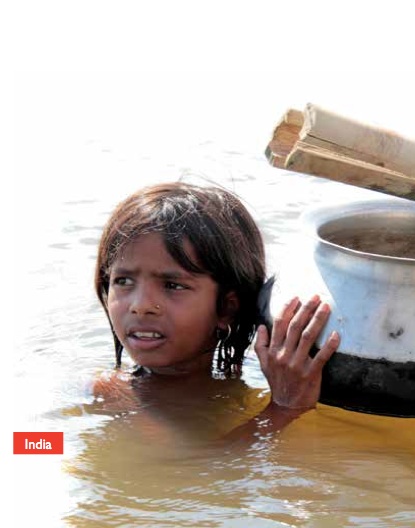
Photo Credit: Save The Children
Climate change is the wild card that threatens even the countries that have made the most progress in maternal and child health. Climate related disasters and extreme weather are factors that can cause severe set backs in development.
The recommendations of the report call for a collaboration between governments, donor countries, international organizations, private sector and civil society to take responsibility, and each do their part to ensure mothers, and children in crisis situations have the best chance to survive, and thrive. Here is what we need to do:
1. Ensure that every mother and newborn living in crisis has access to high quality health care
2. Invest in women and girls and ensure their protection
3. Build longer term resilience to minimize the damaging effects of crises on health.
4. Design emergency interventions with a longer term view and the specific needs of mothers and newborns in mind.
5. Ensure political engagement and adequate financing, coordination and research around maternal and newborn health in crisis settings.
Save The children’s 15th annual State of the Worlds Mothers report comes at a pivotal moment in history, when humanitarian crises have focused a spotlight like never before on the needs of mothers and children who are struggling to survive. With record numbers of people displaced by war and conflict and increasingly severe natural disasters causing unspeakable destruction, it is clear we must do more to help the worlds poorest and most vulnerable families. We must give mothers the support they need to keep their children safe and healthy, even in the darkest times. -Carolyn Miles, President and CEO of Save The Children USA
You can read the State of the Worlds Mothers report in full here. See where your country falls on the Mothers’ Index Rankings here.
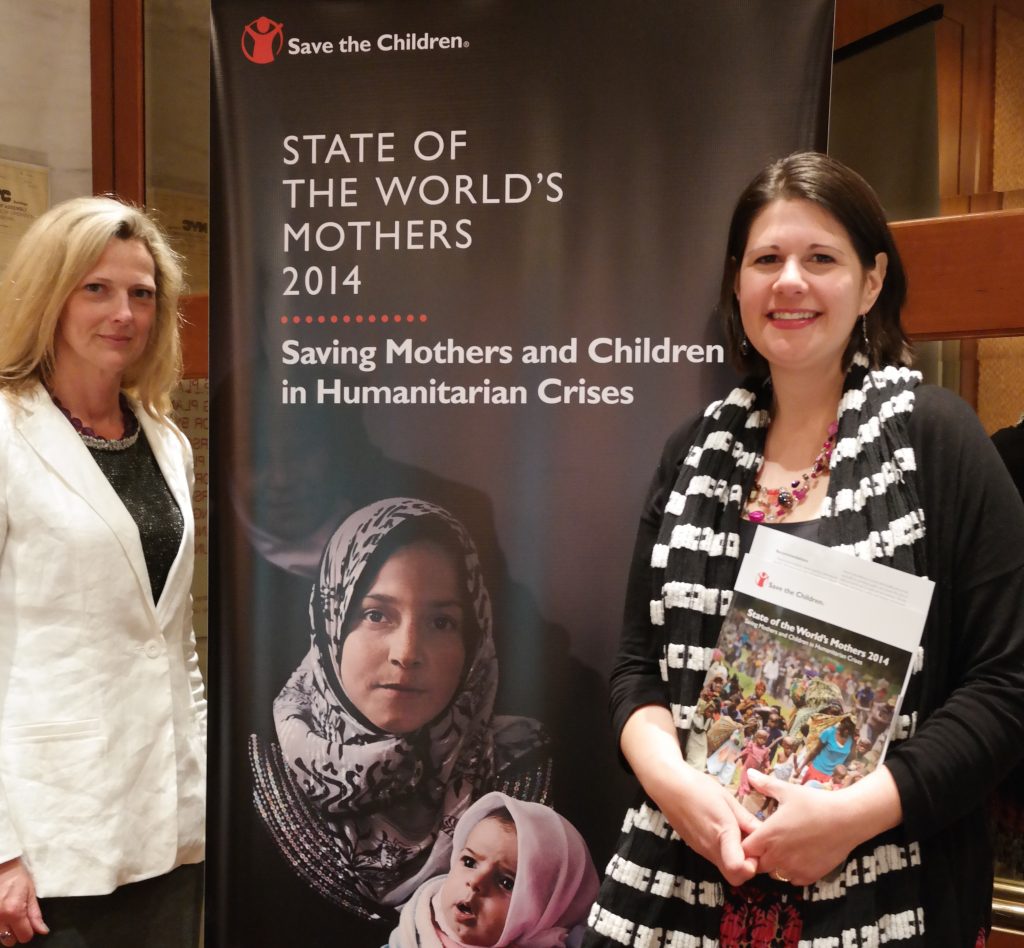
World Moms Blog Founder Jennifer Burden and Senior Editor Elizabeth Atalay at the State of the Worlds Mothers report launch in NYC.
This is an original post written for World Moms Blog by Elizabeth Atalay of Documama.

Elizabeth Atalay is a Digital Media Producer, Managing Editor at World Moms Network, and a Social Media Manager. She was a 2015 United Nations Foundation Social Good Fellow, and traveled to Ethiopia as an International Reporting Project New Media Fellow to report on newborn health in 2014. On her personal blog, Documama.org, she uses digital media as a new medium for her background as a documentarian. After having worked on Feature Films and Television series for FOX, NBC, MGM, Columbia Pictures, Warner Brothers, 20th Century Fox, and Castle Rock Pictures, she studied documentary filmmaking and anthropology earning a Masters degree in Media Studies from The New School in New York. Since becoming a Digital Media Producer she has worked on social media campaigns for non-profits such as Save The Children, WaterAid, ONE.org, UNICEF, United Nations Foundation, Edesia, World Pulse, American Heart Association, and The Gates Foundation. Her writing has also been featured on ONE.org, Johnson & Johnson’s BabyCenter.com, EnoughProject.org, GaviAlliance.org, and Worldmomsnetwork.com. Elizabeth has traveled to 70 countries around the world, most recently to Haiti with Artisan Business Network to visit artisans in partnership with Macy’s Heart of Haiti line, which provides sustainable income to Haitian artisans. Elizabeth lives in New England with her husband and four children.
More Posts

by World Moms Blog | May 10, 2014 | 2014, Education, Girls, Government, Human Rights, Humanitarian, International, Nigeria, School, Social Equality, Social Good, Social Media, Women's Rights, World Moms Blog
Abducted. Scared. Abused.
Sold.
That’s the likely fate 276 girls are facing, taken from their schools in the remote reaches of north-eastern Nigeria by the terrorist group Boko Haram. It’s been over three weeks since this started. We don’t what’s happening to them and we all fear the worst.
We’re sickened. We’re outraged. We also have no idea what to do. So, we’re doing what Americans tend to do. We’re taking selfies of ourselves with the #BringBackOurGirls hashtag. We’re tweeting. We’re posting facebook rants. In the lack of anything else to do, we’re signing online petitions by the thousands to make the world pay attention.

I’m not saying this these are bad actions to take. No! I signed the petition myself. I tweeted #BringBackOurGirls. I liked and shared Amy Poehler’s Smart Girl posts on facebook to help focus the national conversation on them. I was thrilled to hear that the U.S. is sending support and I believe social media was a part of that. But after I did those things, I was still sickened. Still outraged. I still didn’t know what to do.
And then I thought of this girl.

Malala Yousafzai. A Pakistani girl shot in the head by the Taliban at the age of 15 who still fights daily for girls’ education knows a little something about this issue, don’t you think? She has said, “The extremists are afraid of books and pens, the power of education frightens them. They are afraid of women.”
Then, let those men be afraid of me. I am even more dangerous than a schoolgirl with a pen. I’m an educated mother with a laptop. And I’m not just coming after them. I’m coming after their whole oppressive way of life.
The welfare of the kidnapped girls rests in someone else’s hands in the short term, but I advocate against poverty and injustice with an eye for the long term. While we wait and we pray for these girls, shouldn’t we be using this anger and anguish to secure a future for all girls coming after them?
If all children were in school as a normal matter of course, then schools with girls would cease to be obvious targets. That fundamental paradigm shift would be more effective than sending a SEAL Team in to get the girls (even though that is what I dearly want to happen right now) because educated and empowered girls become mothers who raise enlightened sons.
Here’s another Malala quote:
“Our men think earning money and ordering around others is where power lies. They don’t think power is in the hands of the woman who takes care of everyone all day long, and gives birth to their children.” But the men are wrong. Indeed, the hand that rocks the cradle rules the world.
So, what concrete actions can we – as Americans – take right now to hasten this reality? We can start by demanding that our U.S. Representatives pass the Education for All Act (H.R. 2780), which specifically calls out victims of human trafficking as some of the most vulnerable children to help. We can also call on them to sign U.S. Representative Jan Schakowksy’s letter to the Obama administration to fund $250 million over 2 years to the Global Partnership for Education, which aims to raise $3.5 billion from donor governments at a pledging conference this June. With $3.5 billion invested by donors, the Global Partnership can secure an additional $16 billion from developing country governments. By 2018, that investment can support quality education for 29 million children, largely in fragile and conflict-affected states.
As badly as we need the #BringBackOurGirls social media awareness today for the 276 girls we keep vigil for, these two steps are even more needed in the long run to help millions of other girls at risk now and in the future.
So, after you’ve tweeted and posted your selfie on facebook, do not stop there. Click on these links to contact your U.S. Representative about the Education for All Act and the Global Parntership for Education. Tell them that girls are showing incredible courage just to go to school, and the U.S. should support them. Educating all girls and boys will create a world where kidnapping and selling students is not acceptable in any culture on the planet.
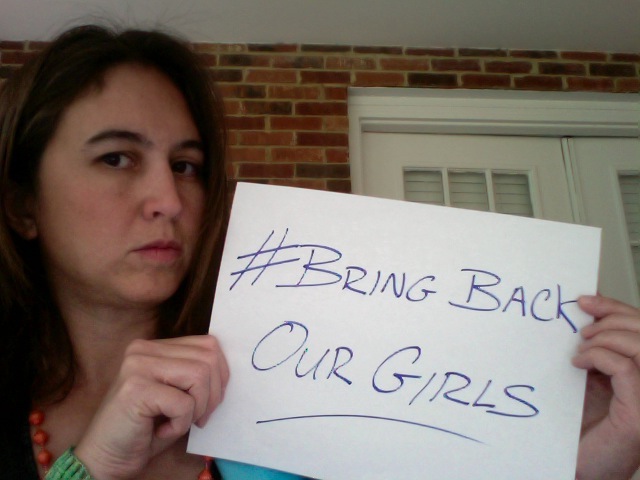
This is an original Post for World Moms Blog by Post by Cindy Changyit Levin who writes the Anti-Poverty Mom blog and is volunteer advocate for RESULTS, Shot@Life and the ONE Campaign. She can also be found on twitter @ccylevin.
Are you ready to take action?
World Moms Blog is an award winning website which writes from over 30 countries on the topics of motherhood, culture, human rights and social good. Over 70 international contributors share their stories from around the globe, bonded by the common thread of motherhood and wanting a better world for their children.
World Moms Blog was listed by Forbes Woman as one of the "Best 100 Websites for Women 2012 & 2013" and also called a "must read" by the NY Times Motherlode in 2013. Our Senior Editor in India, Purnima Ramakrishnan, was awarded the BlogHer International Activist Award in 2013.
More Posts

 Long term goals versus short term goals.
Long term goals versus short term goals.






















